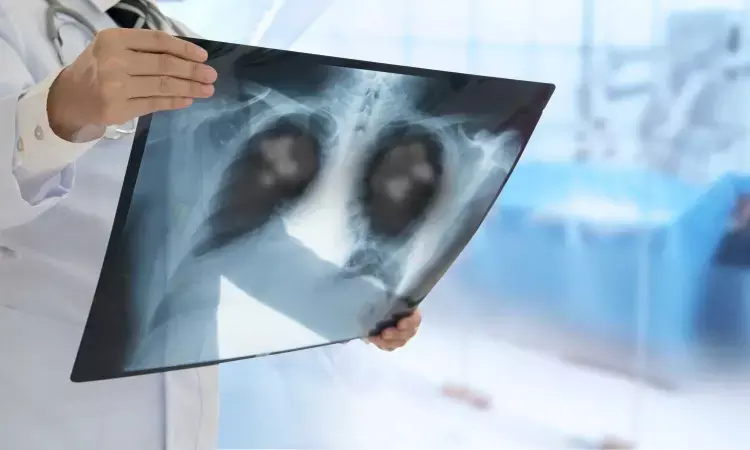- Home
- Medical news & Guidelines
- Anesthesiology
- Cardiology and CTVS
- Critical Care
- Dentistry
- Dermatology
- Diabetes and Endocrinology
- ENT
- Gastroenterology
- Medicine
- Nephrology
- Neurology
- Obstretics-Gynaecology
- Oncology
- Ophthalmology
- Orthopaedics
- Pediatrics-Neonatology
- Psychiatry
- Pulmonology
- Radiology
- Surgery
- Urology
- Laboratory Medicine
- Diet
- Nursing
- Paramedical
- Physiotherapy
- Health news
- Fact Check
- Bone Health Fact Check
- Brain Health Fact Check
- Cancer Related Fact Check
- Child Care Fact Check
- Dental and oral health fact check
- Diabetes and metabolic health fact check
- Diet and Nutrition Fact Check
- Eye and ENT Care Fact Check
- Fitness fact check
- Gut health fact check
- Heart health fact check
- Kidney health fact check
- Medical education fact check
- Men's health fact check
- Respiratory fact check
- Skin and hair care fact check
- Vaccine and Immunization fact check
- Women's health fact check
- AYUSH
- State News
- Andaman and Nicobar Islands
- Andhra Pradesh
- Arunachal Pradesh
- Assam
- Bihar
- Chandigarh
- Chattisgarh
- Dadra and Nagar Haveli
- Daman and Diu
- Delhi
- Goa
- Gujarat
- Haryana
- Himachal Pradesh
- Jammu & Kashmir
- Jharkhand
- Karnataka
- Kerala
- Ladakh
- Lakshadweep
- Madhya Pradesh
- Maharashtra
- Manipur
- Meghalaya
- Mizoram
- Nagaland
- Odisha
- Puducherry
- Punjab
- Rajasthan
- Sikkim
- Tamil Nadu
- Telangana
- Tripura
- Uttar Pradesh
- Uttrakhand
- West Bengal
- Medical Education
- Industry
Deep-learning model using chest radiograph predicts 30-day mortality for patients with community-acquired pneumonia

Korea: A deep learning-based model using initial chest radiographs predicted 30-day mortality in patients with community-acquired pneumonia (CAP), improving upon the performance of an established risk prediction tool (i.e., CURB-65 score), an accepted manuscript published in ARRS’ own American Journal of Roentgenology (AJR) has shown.
“The deep learning (DL) model may guide clinical decision-making in the management of patients with CAP by identifying high-risk patients who warrant hospitalization and intensive treatment,” concluded first author Eui Jin Hwang, MD, PhD, from the Department of Radiology at Seoul National University College of Medicine in Korea.
In this AJR-accepted manuscript, a DL model was developed in 7,105 patients via one institution from March 2013 to December 2019 (3:1:1 allocation to training, validation, and internal test sets) to predict the risk of all-cause mortality within 30 days after CAP diagnosis using patients’ initial chest radiograph. Hwang et al. then evaluated their DL model in patients diagnosed with CAP during emergency department visits at the same institution as the development cohort from January 2020 to December 2020 [temporal test cohort (n = 947)], and from two additional different institutions [external test cohort A (n = 467), January 2020 to December 2020; external test cohort B (n = 381), March 2019 to October 2021]. AUCs were compared between the DL model and a risk score based on confusion, blood urea nitrogen level, respiratory rate, blood pressure, and age ≥ 65 years.
A DL model using initial chest radiographs ultimately predicted 30-day all-cause mortality in patients with CAP with AUC ranging from 0.77 to 0.80 in test cohorts from different institutions. Additionally, the model showed higher specificity (range, 61–69%) than the CURB-65 score (44–58%) at the same sensitivity (all p < .001).
Reference:
Changi Kim, Eui Jin Hwang, Ye Ra Choi, Hyewon Choi, Jin Mo Goo, Yisak Kim, Jinwook Choi, and Chang Min Park,A Deep-Learning Model Using Chest Radiographs for Prediction of 30-Day Mortality in Patients With Community-Acquired Pneumonia: Development and External Validation, https://doi.org/10.2214/AJR.23.2941
Dr Kamal Kant Kohli-MBBS, DTCD- a chest specialist with more than 30 years of practice and a flair for writing clinical articles, Dr Kamal Kant Kohli joined Medical Dialogues as a Chief Editor of Medical News. Besides writing articles, as an editor, he proofreads and verifies all the medical content published on Medical Dialogues including those coming from journals, studies,medical conferences,guidelines etc. Email: drkohli@medicaldialogues.in. Contact no. 011-43720751


